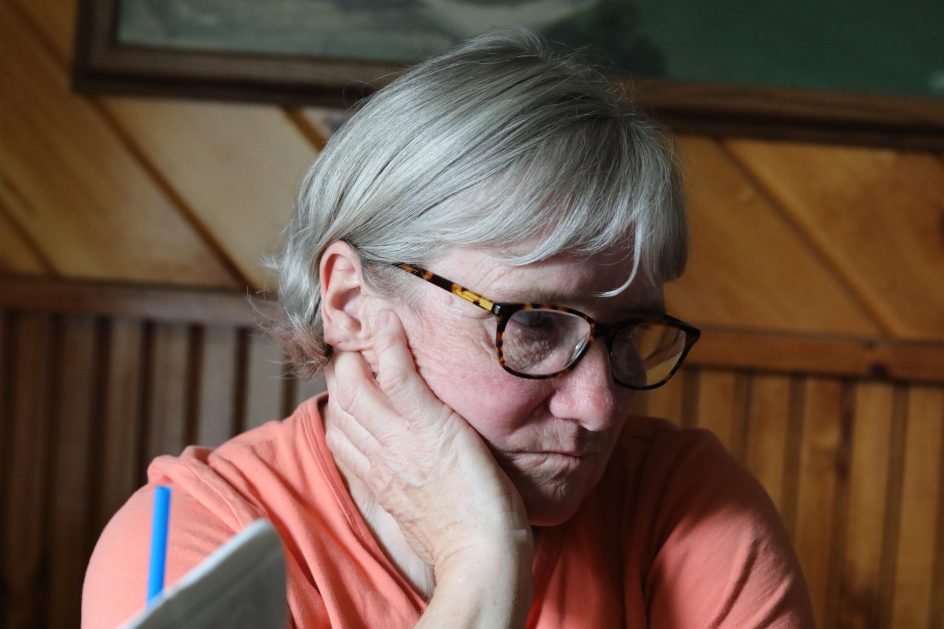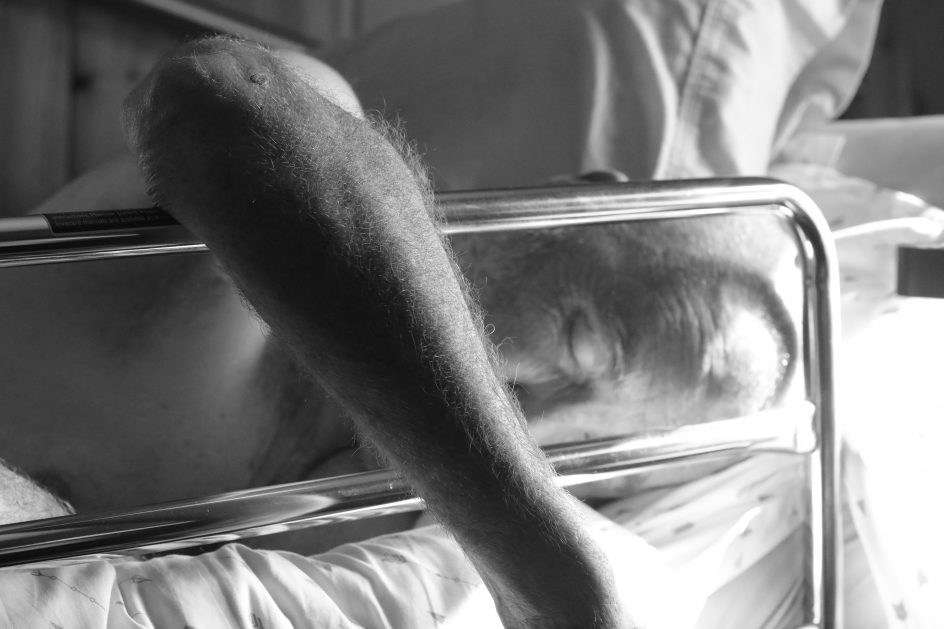
Carol Gulley is a life-long dairy farmer, not once in her life did she expect to be in the situation she is in now, a full-time caregiver to her strong and powerful husband – she calls him My Farmer – who is dying from terminal and untreatable brain cancer.
A few weeks ago, he was pulling calves out of enormous cows and milking twice a day. Today, he can no longer sit up by himself. Carol is tough and smart, but her face reveals the pain and turmoil inside. She is a friend of mine, and I worry about the burden she is carrying.
The two are famously in love, and have been married for more than 40 years, they shared every hard farmer’s day working side-by-side in cold, heat, snow and rain for nearly half a century.
Yesterday, when she came to check on him, Ed told her to go away and just let him die. This morning, he pushed her away. An hour later, he was sketching and asking for food.
Ed’s brain cancer is changing his body and his mind. He has sudden and abrupt emotional shifts, sometimes sleeping, sometimes crying, sometimes lashing out in frustration over his inability to carry out even the simplest tasks of life – sitting up, standing up, going to the bathroom, getting dressed, staying awake.

Ed is sometimes recognizable as himself, sometimes not, and most of the time, he is not awake or fully aware of what is happening around him.
Carol has a loving and devoted family around her – four children and many grandchildren – they all want to help and are helping. She is by no means alone.
Yet she is very much alone, as along as she has ever been in her life. As alone as only caregivers can be.
Monday afternoon, I went to sit with Ed, as I do most afternoons, he is no longer able to speak to me much, I just sit quietly and read and once in a while he opens his eyes, says hello, and then drifts back to sleep. Sometimes he recognizes me, sometimes not, sometimes we can talk, sometimes not. We can no longer do our videos or tell jokes or philosophize with one another.
We are both story-tellers and kidders, there is none of that, although I did read quotations from St. Francis to Ed while he slept.
Today, while he was sleeping, Carol invited me to come into the kitchen and we talked: about listening, about respecting the wishes of the dying, about exhaustion, about understanding.
She knows he is not himself when he tells her to get away, but it still hurts, and she still struggles with a life of never-ending caregiving work – Ed can no longer care for himself – and exhaustion, it is hard to find even a few minutes to sleep.
Caregivers no there is no more important or thankless or unending or draining work than caregiving.
It was a good talk, we talked about knowing when the time comes to let Ed go, and understanding when that moment is.
Carol is beginning to reach out to hospice nurses and social workers and her family doctor and online friends for guidance and support. She now wants to know what to expect and how to handle it. She is learning by the day.
She is also faithfully chronicling her efforts to come to terms with this new reality on her and Ed’s blog, the Bejosh Farm Journal. She has found her voice there.
She knows that barring something unexpected, the worst is yet to come. She knows Ed loves her and she knows he hates to be so dependent on her or anyone else. She wishes she could ease his suffering, but she can’t.
I’ve met a lot of caregivers in my therapy work, they touched my heart, sometimes even more than the people they care for. They are the unsung heroes of our barbaric country, which so determinedly resists helping to support care for the sick and the dying, or paying for it.
A caregiver is an unpaid and usually untrained person – a spouse, partner, family member, friend or neighbor – involved in assisting sick or aging people with the routines of daily living and/or medical tasks and care.
Carol was stunned to learn when I told her that in the last 12 months approximately 43.5 million caregivers have provided unpaid care to an adult or child.
About 34.2 million Americans have provided unpaid care to an adult age 50 or older in the last year. Approximately 39.8 million caregivers provide care to adults 18 and over with a disability or illness or 16.6 per cent of all Americans.
About 15.7 million adult caregivers care for someone suffering from Alzheimer’s disease or other dementia.
The vast majority of these people are much like Carol, they are suddenly thrust in a painful, frightening, and extraordinarily difficult and labor intensive role that will consume their lives for days or weeks or months or even years. Caregiving was not their work or ambition, it is a literal giving of the self to another, really the work of Mother Theresa or Jesus or St. Francis more than average Americans.
Unlike other civilized nations, the United States provides little in the way of financial or other support for these caregivers, who struggle to help their parents or lovers or spouses, or in many cases, their children navigate illness, impairment, aging or death.
They work to ease their pain, keep them at home, make them comfortable. Unless they are wealthy, they know they can provide better and more humane and immediate support than almost any other institution.
They willingly give up their lives for someone they love, once you are in you are in deep.
The trained and paid nurses and health care workers will testify to how difficult and exhausting this work is when you are trained and paid for it. Carol is learning how overwhelming this work is when it becomes your life, usually every hour of every day. Life is upended, so is sleep and work and any kind of normality, rest or recreation.
One minute Carol is helping Ed to sit up, another giving him medicine, another, helping him use the toilet, another bringing him a drink, or pencils to draw with, or food, or turning on the radio, or turning it off, or greeting a visitor, or trying to clean the house and do the dishes and go shopping, and perform diabetic blood tests, or count pills, or buy pills, or change sheets or clothes or do laundry and in between, trying to move a large and powerful man who cannot move himself or talking to doctors or pharmacists or trying to pay bills.
Her family is present, they help, they are devoted, but they have their own lives and jobs and homes and kids, they cannot be there all of the time.
Carol doesn’t want them to be there all the time, neither does Ed. They want their children to have their own lives.
There is no softening or evading it, caring for the partner she has loved while he prepares to leave this world falls on Carol. She is the caregiver. She sees it as her responsibility, and I have to agree. It is. Nurses come and go, so do aides and social workers. She is always there. She is the one he knows and trusts, even to shout at.
And on top of this Carol knows she will soon have to decide how to let Ed go and when to let him go, how to respect his wishes and also take care of him, what the lines are between responsibility and surrender, how to balance the instincts of love with the instincts of caregiving.
I am committed to coming every day. He is my friend, so is she. You do so much, Carol says, but I know I do nothing really, but bring some corn and berries. I am not a caregiver.
Now, it seems, my role is to sit silently with Ed while reading a book. When he opens his eyes, I wave. Often, Maria comes with me, she and Carol are close friends and she is a good listener.
This is what we can do, this is all we can do.
My heart often goes out to the caregivers all across America who step in where nobody else wants to go. Where the government refuses to go.
One day, I dream we may advance enough as a civilization to spend half as much on caregiving to sick and aging Americans as we do on new tanks and submarines.
Caregivers are the barrier between peace of mind and nightmares. They help people heal and die good deaths.
It seems I will not live to see the day when we as a society and nation help the caregivers in a meaningful way but i know the day will come. One day the caregivers will stick their heads up from their grinding work and talk to one another, perhaps online. Maybe they will all go to vote for someone with a heart.
Forty-three point five million people can change the world in a hurry.

thanks Jon….no one could ever say it better than you ….
I am not usually one who comments. But I am a caretaker. My husband and I have a 32 yr. old daughter who is multiply disabled, and has been since birth. She is a wonderful human being and the light of my life, but she requires, and always has, a tremendous amount of time and energy. I truly empathize with the difficulty of being one who provides love and support for a loved one. Life is often a battle, making decisions for another is harrowing. May Carol and peace in her journey.
Thanks for the comment Pam, and good luck to you and your family.
I was in Carol’s shoes during 2016. Jon, tears came to my eyes when I read your post. You know, you realize the horrendous job it is being a caregiver. I did it with love, as Carol is doing. It took me awhile to realize when my husband said harsh things to me that it was not really him. A stranger had come and invaded his brain. I would like to hug Carol and tell her to hang in there. It is a lonely role and one really walks it alone even with family nearby. We love them so much and the feeling of helplessness is overwhelming. May Carol find peace on this journey and Jon, you are doing much more than you realize by just being there.
Thanks Sandy..I do feel helpless to help, but yours is a nice message to hear..thanks..